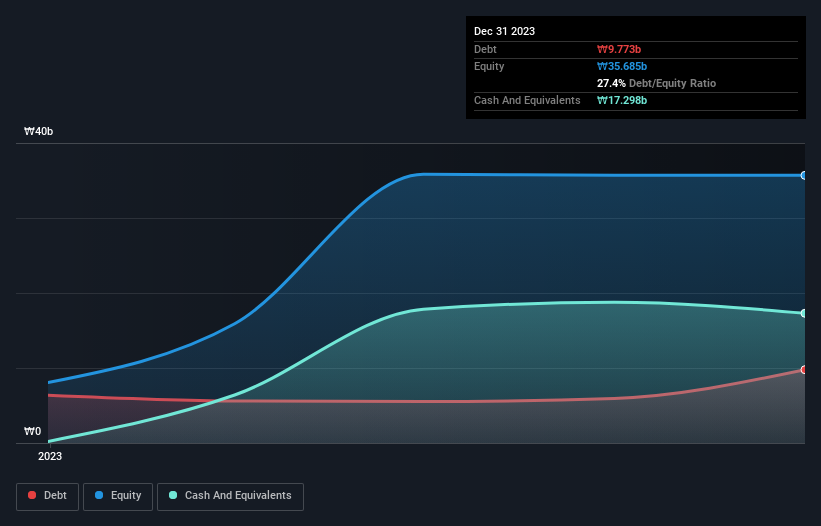- South Korea
- /
- Consumer Durables
- /
- KOSDAQ:A407400
Does GGUMBI (KOSDAQ:407400) Have A Healthy Balance Sheet?
David Iben put it well when he said, 'Volatility is not a risk we care about. What we care about is avoiding the permanent loss of capital.' It's only natural to consider a company's balance sheet when you examine how risky it is, since debt is often involved when a business collapses. We can see that GGUMBI Inc. (KOSDAQ:407400) does use debt in its business. But is this debt a concern to shareholders?
Why Does Debt Bring Risk?
Debt is a tool to help businesses grow, but if a business is incapable of paying off its lenders, then it exists at their mercy. In the worst case scenario, a company can go bankrupt if it cannot pay its creditors. While that is not too common, we often do see indebted companies permanently diluting shareholders because lenders force them to raise capital at a distressed price. By replacing dilution, though, debt can be an extremely good tool for businesses that need capital to invest in growth at high rates of return. The first step when considering a company's debt levels is to consider its cash and debt together.
See our latest analysis for GGUMBI
What Is GGUMBI's Net Debt?
You can click the graphic below for the historical numbers, but it shows that as of December 2023 GGUMBI had ₩9.77b of debt, an increase on ₩6.37b, over one year. However, it does have ₩17.3b in cash offsetting this, leading to net cash of ₩7.52b.

How Strong Is GGUMBI's Balance Sheet?
According to the last reported balance sheet, GGUMBI had liabilities of ₩8.11b due within 12 months, and liabilities of ₩5.42b due beyond 12 months. Offsetting these obligations, it had cash of ₩17.3b as well as receivables valued at ₩4.38b due within 12 months. So it actually has ₩8.16b more liquid assets than total liabilities.
This short term liquidity is a sign that GGUMBI could probably pay off its debt with ease, as its balance sheet is far from stretched. Succinctly put, GGUMBI boasts net cash, so it's fair to say it does not have a heavy debt load! The balance sheet is clearly the area to focus on when you are analysing debt. But it is GGUMBI's earnings that will influence how the balance sheet holds up in the future. So if you're keen to discover more about its earnings, it might be worth checking out this graph of its long term earnings trend.
In the last year GGUMBI wasn't profitable at an EBIT level, but managed to grow its revenue by 6.4%, to ₩29b. That rate of growth is a bit slow for our taste, but it takes all types to make a world.
So How Risky Is GGUMBI?
Statistically speaking companies that lose money are riskier than those that make money. And in the last year GGUMBI had an earnings before interest and tax (EBIT) loss, truth be told. And over the same period it saw negative free cash outflow of ₩13b and booked a ₩2.3b accounting loss. But at least it has ₩7.52b on the balance sheet to spend on growth, near-term. Even though its balance sheet seems sufficiently liquid, debt always makes us a little nervous if a company doesn't produce free cash flow regularly. There's no doubt that we learn most about debt from the balance sheet. However, not all investment risk resides within the balance sheet - far from it. To that end, you should be aware of the 3 warning signs we've spotted with GGUMBI .
At the end of the day, it's often better to focus on companies that are free from net debt. You can access our special list of such companies (all with a track record of profit growth). It's free.
New: Manage All Your Stock Portfolios in One Place
We've created the ultimate portfolio companion for stock investors, and it's free.
• Connect an unlimited number of Portfolios and see your total in one currency
• Be alerted to new Warning Signs or Risks via email or mobile
• Track the Fair Value of your stocks
Have feedback on this article? Concerned about the content? Get in touch with us directly. Alternatively, email editorial-team (at) simplywallst.com.
This article by Simply Wall St is general in nature. We provide commentary based on historical data and analyst forecasts only using an unbiased methodology and our articles are not intended to be financial advice. It does not constitute a recommendation to buy or sell any stock, and does not take account of your objectives, or your financial situation. We aim to bring you long-term focused analysis driven by fundamental data. Note that our analysis may not factor in the latest price-sensitive company announcements or qualitative material. Simply Wall St has no position in any stocks mentioned.
About KOSDAQ:A407400
Excellent balance sheet with low risk.
Market Insights
Community Narratives




